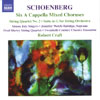Schoenberg (6) A cappella Folksongs; Suite in G; String Quartet No 2
Schoenberg a traditionalist? Here’s the proof – and his ‘own’ work, too
View record and artist detailsRecord and Artist Details
Composer or Director: Arnold Schoenberg
Genre:
Vocal
Label: Naxos
Magazine Review Date: 2/2006
Media Format: CD or Download
Media Runtime: 78
Mastering:
Stereo
DDD
Catalogue Number: 8 557521

Tracks:
| Composition | Artist Credit |
|---|---|
| (3) Volkslieder, Movement: Es gingen zwei Gespielen gut |
Arnold Schoenberg, Composer
Arnold Schoenberg, Composer Robert Craft, Conductor Simon Joly Singers |
| (3) Volkslieder, Movement: Der Mai tritt ein mit Freuden |
Arnold Schoenberg, Composer
Arnold Schoenberg, Composer Robert Craft, Conductor Simon Joly Singers |
| (3) Volkslieder, Movement: Mein Herz in steten Treuen |
Arnold Schoenberg, Composer
Arnold Schoenberg, Composer Robert Craft, Conductor Simon Joly Singers |
| (3) Deutsche Volkslieder, Movement: Es gingen zwei Gespielen |
Arnold Schoenberg, Composer
Arnold Schoenberg, Composer Robert Craft, Conductor Simon Joly Singers |
| (3) Deutsche Volkslieder, Movement: Herzlieblich Lieb, durch Scheiden |
Arnold Schoenberg, Composer
Arnold Schoenberg, Composer Robert Craft, Conductor Simon Joly Singers |
| (3) Deutsche Volkslieder, Movement: Schein uns, du liebe Sonne |
Arnold Schoenberg, Composer
Arnold Schoenberg, Composer Robert Craft, Conductor Simon Joly Singers |
| String Quartet No. 2 |
Arnold Schoenberg, Composer
Arnold Schoenberg, Composer Fred Sherry String Quartet Jennifer Welch-Babidge, Soprano Robert Craft, Conductor |
| Suite for Strings |
Arnold Schoenberg, Composer
Arnold Schoenberg, Composer Robert Craft, Conductor Twentieth Century Classics Ensemble |
Author: Arnold Whittall
Schoenberg always made a clear distinction between his aspirations as a composer and his responsibilities as a teacher. Refusing to teach the elements of his own innovative techniques, he remained fervently committed to grounding students in the traditional skills of tonal harmony and counterpoint, from time to time producing compositions which had little or nothing to do with atonality or serialism but were designed to demonstrate the virtues of the ‘old’ style.
This disc contains two such works. The Suite in G for string orchestra (1934) is actually subtitled ‘in the old style’ but it sounds closer to the kind of early-20th-century idiom associated with a composer such as Max Reger, or even Busoni, than to imitation Bach or Mozart. The final Gigue is the most immediately appealing movement but Robert Craft directs a sprightly performance that gives the whole piece much-needed light and air.
The two sets of German folksong arrangements (from 1928 and 1948) weave sophisticated polyphonic fabrics around quite simple tunes, proving Schoenberg’s point that such compositional exercises could be as accomplished in their own terms as any genuinely new composition: for example, his own Second Quartet. While this is a much-recorded piece – my preferred version is by the Aron Quartet on Preiser – this is an expertly played, well characterised account. Jennifer Welch-Babidge sings strongly and truly in the final pair of movements, although I’d have preferred a recorded balance which placed her more discreetly within the ensemble, rather than (apparently) in front of it.
This disc contains two such works. The Suite in G for string orchestra (1934) is actually subtitled ‘in the old style’ but it sounds closer to the kind of early-20th-century idiom associated with a composer such as Max Reger, or even Busoni, than to imitation Bach or Mozart. The final Gigue is the most immediately appealing movement but Robert Craft directs a sprightly performance that gives the whole piece much-needed light and air.
The two sets of German folksong arrangements (from 1928 and 1948) weave sophisticated polyphonic fabrics around quite simple tunes, proving Schoenberg’s point that such compositional exercises could be as accomplished in their own terms as any genuinely new composition: for example, his own Second Quartet. While this is a much-recorded piece – my preferred version is by the Aron Quartet on Preiser – this is an expertly played, well characterised account. Jennifer Welch-Babidge sings strongly and truly in the final pair of movements, although I’d have preferred a recorded balance which placed her more discreetly within the ensemble, rather than (apparently) in front of it.
Discover the world's largest classical music catalogue with Presto Music.

Gramophone Digital Club
- Digital Edition
- Digital Archive
- Reviews Database
- Full website access
From £8.75 / month
Subscribe
Gramophone Full Club
- Print Edition
- Digital Edition
- Digital Archive
- Reviews Database
- Full website access
From £11.00 / month
Subscribe
If you are a library, university or other organisation that would be interested in an institutional subscription to Gramophone please click here for further information.




